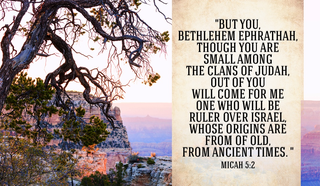Change Translation
- Recent Translations
- All Translations
Micah 5:5
Share
Listen to Micah 5:5
Settings
Scripture Text Size
5
And this [man] shall be [our] peace. When the Assyrian shall come into our land, and when he shall tread in our palaces, then shall we raise against him seven shepherds, and eight principal men.
Micah 5:5 Meaning and Commentary
Micah 5:5
not Sennacherib king of Assyria; though by the invasion of Judea, and siege of Jerusalem, he might have lately been concerned in, and by reason of the terror which that had raised in the people; the Assyrian may be here put for any powerful enemy of the people of God in later times; or Satan, and his principalities and powers, even all the powers of darkness Christ our peacemaker engaged with, at the time he made peace by his sufferings and death; and perhaps may chiefly design the Turk, the Gog and Magog of Ezekiel, as Mr. Mede F26 thinks, that will enter into the land of Judea, in order to take it out of the hands of the Jews, who will be possessed of it upon their conversion to Christ; but he by his instruments will secure to them the possession of it, and their peace and prosperity in it: and when he shall tread in our palaces;
the palaces of our princes, and nobles, and great men, at least attempt to do it: then shall we raise against him;
the Assyrian, or whatsoever enemy is meant by him: or, "with him", that is, the Messiah, as Kimchi and others F1 interpret it. The Targum is,
that is, many, as the phrase is used in ( Ecclesiastes 11:2 ) ; to which passage Aben Ezra and Kimchi refer us; these are, as the last mentioned writer and others say F2, the princes of the Messiah; and, according to the ancient F3 Jewish Rabbins, the seven shepherds are particularly these, David in the midst, Adam, Seth, Methuselah, on his right hand (Kimchi has it, Seth, Enoch, and Methuselah), and Abraham, Jacob, and Moses, on his left hand; and the eight principal men are, Jesse, Saul, Samuel, Amos, Zephaniah, Zedekiah (in Kimchi and Rabbot it is Hezekiah), Elijah, and the Messiah; but, as Aben Ezra, not fifteen persons are designed, at most but eight, according to this form of speech in ( Proverbs 30:15 Proverbs 30:18 Proverbs 30:21 Proverbs 30:24 Proverbs 30:29 ) ( Amos 1:3 ) ; &c. Calmet F4 takes those seven or eight shepherds to he the seven princes confederate with Darius the son of Hystaspes, who killed Smerdis the Magian, who had possessed himself of the empire of the Persians, after the death of Cambyses; but Smerdis was not an Assyrian, nor is the kingdom of Persia here meant, but the land of Judea; and the prophecy respects the times of the Messiah, who should appear there, and where would be raised up men to support his interest: and if conjecture may be allowed, as this may be understood of the apostles and first preachers of the Gospel, the princes of the Messiah, who were raised up, at the prayer and request of the church, to oppose Satan and his emissaries, in the first times of the Gospel; by these may be meant the writers of the New Testament, the four evangelists, Matthew, Mark, Luke, and John, and the Apostles Peter, James, and Jude, which make the seven shepherds; and if you add to these the Apostle Paul, they will make eight principal men; or rather I should think the seven angels are pointed at, that shall pour out the last plagues on the antichristian states; to which, if another angel is added, that will proclaim the fall of Babylon, the same number will be made up; see ( Revelation 16:1 ) ( 18:1 ) ; and who will assist the Jews against the Turks, when they shall attempt to dispossess them of their land, they shall again inherit.
FOOTNOTES:
F24 Ut supra. (Chizzuk Emunah, par. 1. p. 281.)
F25 Echa Rabbati, fol. 48. 3.
F26 Works, l. 4. Ep. 41. p. 796.
F1 Vid. Chizzuk Emunah, par. 1. p. 282.
F2 Ibid.
F3 T. Bab. Succa, fol. 52. 2. Shirhashirim Rabba, fol. 26. 3.
F4 Dictionary, in the word "Shepherds".
And this [man] shall be the peace
The word man is not in the text, only this; and refers to the person before spoken of, who was to be born in Bethlehem, to be the ruler in Israel, that should stand and feed his people, and should be great to the ends of the earth; and is no other than the Messiah, as Kimchi, and other Jewish writers, own, Kimchi's note is,
``this peace respects the Messiah; for he shall be the cause or author of peace; as it is said, "he shall speak peace unto the Heathen", ( Zechariah 9:10 ) ;''and R. Isaac F24 expresses his sense of the words in much the same language; and it is an observation the Jews sometimes make, and which they give as a sign of the Messiah's coming,
``when you see a Persian horse bound in the land of Israel, look for the feet of the Messiah;''which is the sense of ( Micah 5:5 ) ; "this shall be the peace, when the Assyrian comes into our land" F25 so Jesus the true Messiah is called "our peace", ( Ephesians 2:14 ) ; and is the cause and author of peace, not only between Jew and Gentile, but between God and men; which he has made by the blood of his cross, and speaks and gives peace to men; and he is the author of peace in his churches, whose kingdom is a kingdom of peace, of which there will be an abundance in the latter day; for all which he would not be sufficient was he a mere man; though it was proper he should be a man, that he might have blood to shed, a body to offer up, and in it die to procure peace; and yet be more than a man, God also, to put virtue and efficacy into what he did and suffered to obtain it, as well as to secure and continue the peace of his people, and preserve them from all their enemies: when the Assyrian shall come into our land;
not Sennacherib king of Assyria; though by the invasion of Judea, and siege of Jerusalem, he might have lately been concerned in, and by reason of the terror which that had raised in the people; the Assyrian may be here put for any powerful enemy of the people of God in later times; or Satan, and his principalities and powers, even all the powers of darkness Christ our peacemaker engaged with, at the time he made peace by his sufferings and death; and perhaps may chiefly design the Turk, the Gog and Magog of Ezekiel, as Mr. Mede F26 thinks, that will enter into the land of Judea, in order to take it out of the hands of the Jews, who will be possessed of it upon their conversion to Christ; but he by his instruments will secure to them the possession of it, and their peace and prosperity in it: and when he shall tread in our palaces;
the palaces of our princes, and nobles, and great men, at least attempt to do it: then shall we raise against him;
the Assyrian, or whatsoever enemy is meant by him: or, "with him", that is, the Messiah, as Kimchi and others F1 interpret it. The Targum is,
``then will we appoint over us;''which sense the above writer wonders at, as being contrary to the Hebrew text: seven shepherds, and eight principal men;
that is, many, as the phrase is used in ( Ecclesiastes 11:2 ) ; to which passage Aben Ezra and Kimchi refer us; these are, as the last mentioned writer and others say F2, the princes of the Messiah; and, according to the ancient F3 Jewish Rabbins, the seven shepherds are particularly these, David in the midst, Adam, Seth, Methuselah, on his right hand (Kimchi has it, Seth, Enoch, and Methuselah), and Abraham, Jacob, and Moses, on his left hand; and the eight principal men are, Jesse, Saul, Samuel, Amos, Zephaniah, Zedekiah (in Kimchi and Rabbot it is Hezekiah), Elijah, and the Messiah; but, as Aben Ezra, not fifteen persons are designed, at most but eight, according to this form of speech in ( Proverbs 30:15 Proverbs 30:18 Proverbs 30:21 Proverbs 30:24 Proverbs 30:29 ) ( Amos 1:3 ) ; &c. Calmet F4 takes those seven or eight shepherds to he the seven princes confederate with Darius the son of Hystaspes, who killed Smerdis the Magian, who had possessed himself of the empire of the Persians, after the death of Cambyses; but Smerdis was not an Assyrian, nor is the kingdom of Persia here meant, but the land of Judea; and the prophecy respects the times of the Messiah, who should appear there, and where would be raised up men to support his interest: and if conjecture may be allowed, as this may be understood of the apostles and first preachers of the Gospel, the princes of the Messiah, who were raised up, at the prayer and request of the church, to oppose Satan and his emissaries, in the first times of the Gospel; by these may be meant the writers of the New Testament, the four evangelists, Matthew, Mark, Luke, and John, and the Apostles Peter, James, and Jude, which make the seven shepherds; and if you add to these the Apostle Paul, they will make eight principal men; or rather I should think the seven angels are pointed at, that shall pour out the last plagues on the antichristian states; to which, if another angel is added, that will proclaim the fall of Babylon, the same number will be made up; see ( Revelation 16:1 ) ( 18:1 ) ; and who will assist the Jews against the Turks, when they shall attempt to dispossess them of their land, they shall again inherit.
F24 Ut supra. (Chizzuk Emunah, par. 1. p. 281.)
F25 Echa Rabbati, fol. 48. 3.
F26 Works, l. 4. Ep. 41. p. 796.
F1 Vid. Chizzuk Emunah, par. 1. p. 282.
F2 Ibid.
F3 T. Bab. Succa, fol. 52. 2. Shirhashirim Rabba, fol. 26. 3.
F4 Dictionary, in the word "Shepherds".
Taken from John Gill's Exposition of the Bible
Unlock Deeper Insights: Get Over 20 Commentaries with Plus! Subscribe Now
Micah 5:5 In-Context
3
Therefore will he give them up, until the time that she who travaileth hath brought forth: then the residue of his brethren shall return unto the children of Israel.
4
And he shall stand, and shall feed [his flock] in the strength of Jehovah, in the majesty of the name of Jehovah his God: and they shall abide; for now shall he be great unto the ends of the earth.
5
And this [man] shall be [our] peace. When the Assyrian shall come into our land, and when he shall tread in our palaces, then shall we raise against him seven shepherds, and eight principal men.
6
And they shall waste the land of Assyria with the sword, and the land of Nimrod in the entrances thereof: and he shall deliver us from the Assyrian, when he cometh into our land, and when he treadeth within our border.
7
And the remnant of Jacob shall be in the midst of many peoples as dew from Jehovah, as showers upon the grass, that tarry not for man, nor wait for the sons of men.
The American Standard Version is in the public domain.

